×
Every now and then you meet a person who is so utterly and completely in love with their passion that it takes over their life and defines not only what they do, but also who they are. After a few hours in the company of Debra Salem I left her not quite knowing where she stopped and the music started; the two seem to seamlessly mesh into one glorious dynamo of super-composed energy. Debra is a part-time music teacher, theatre composer, singer-songwriter, arranger of songs for choirs, choir mistress, Horsecross creative learning team member and all round lover of jazz, trad, Celtic, rock, heavy metal and every other musical genre in between. In fact, I feel as though I should be playing a bit of Joni Mitchell while I write – it doesn’t seem correct to be doing this in a quiet room!
She was born in Belfast in 1964 and even after a decade in Perth still has that gorgeous Northern Irish accent that lifts any conversation into a bit of a song. Her mum and dad were both musical and she and her sisters were taken to classical concerts on Friday nights; she can’t recall a time that she didn’t have music in her life.
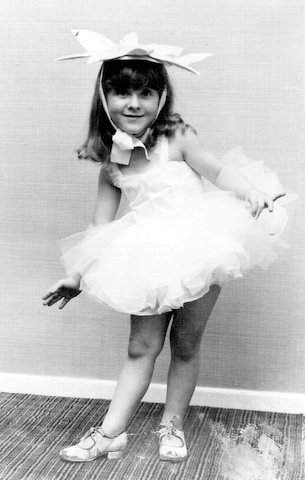 “Always, always I have loved music. Whenever my sisters would go to dancing class I’d be outside waiting on them.This one time I went up and started playing the piano in the hall – I must’ve been about three. I was making little tunes, you know, funny little songs. So my parents found me a piano teacher; but he was really meant for older pupils so I was taught how to play a tune instead of how to understand music. They wouldn’t do that now.
“Always, always I have loved music. Whenever my sisters would go to dancing class I’d be outside waiting on them.This one time I went up and started playing the piano in the hall – I must’ve been about three. I was making little tunes, you know, funny little songs. So my parents found me a piano teacher; but he was really meant for older pupils so I was taught how to play a tune instead of how to understand music. They wouldn’t do that now.
Then I went to the Lila Corrie Dancing School when I was 5 or 6 and I tap danced along to Thumbelina. For as far back as I can remember I played music – Billie Holiday was my inspiration. I loved her from the first minute I heard her.”
Anyone paying close attention will have realised that if you were born in Northern Ireland in 1964, you will have been brought up through The Troubles; she tells me it wasn’t until she left and came back she realised the vast impact that they had had on her life and on the people around her.
“I have always recalled the first song I ever wrote properly, with the tune and words all written down. I was about ten and it was about a woman who’d lost her lover to the fighting. (At this point she sings it to me; verse after verse of a man killed and the loss felt by the woman he left behind.)
That’s all we knew; I was Jewish of course so I didn’t fit into any camp – I went to a mixed primary school and a Protestant Girls Grammar School even though I lived in a Catholic area. I went through that stage at secondary where all my songs were about unrequited love. My friends from school would come over to my house for parties with my pals from my neighbourhood and I remember one where there was exactly the right number of boys and girls and as I was playing they all paired off and started snogging. I reckon I did wonders for the peace movement that night!”

The idea of a Jewish girl growing up in The Northern Irish Troubles of the seventies is one that has never occurred to me before; Debra tells me that she was reading through a teenage journal and came across an entry that said ‘Bobby Sands died tonight. How many troops been drafted in now. Dad won’t let me have my hair streaked.’
“The two things were the same in my mind – it was just everyday life. I look at that now and I’m shocked.”
Throughout her teens she was always serious about songwriting and drama and each year she’d enter the Nationwide Christmas Carol Writing Competition…
“But because I was Jewish my mother wouldn’t let me mention Jesus. So I had to write the carols with no mention of him at all. It was ridiculous. The year after my mum died I threw him in to see what would happen but it didn’t feel right.”
Debra was sixteen when her Mum died of pancreatic cancer; we talk a bit about how it affects who you are as a person when you lose a parent as a young teenager. She tells me that her mother had been the creative talent in the family photography business and although her dad was a great technical photographer who could also fix any camera, her mum had a natural talent and brilliant eye. “And people loved her – she was missed by an entire community when she died. It struck me how much of an impact her work had made on people’s lives. I suppose I found some comfort in that.”
At eighteen she headed for Leicester Polytechnic to do a degree in Performing Arts which was headed up by composer Gavin Bryars and had John White as head of piano.
“I loved it – I really loved it. Although we’d covered music, dance, drama and arts admin it was music that was my major. I did have a rethink just after I started though and I would go every year and say ‘can I switch to drama next term?’ but I never did. I was a singer, my piano was ropey at best and I remember having to teach myself a bar a day to get through my final exams. I had an incredible time; I did a duet with Gavin who played bass while I sung; our tutor knew Steve Reich and we were the only people in the UK at the time who were allowed to perform his music; I saw Sheila Jordon play in a jazz club and it blew me away – I knew I was experiencing opportunities that other people didn’t have.
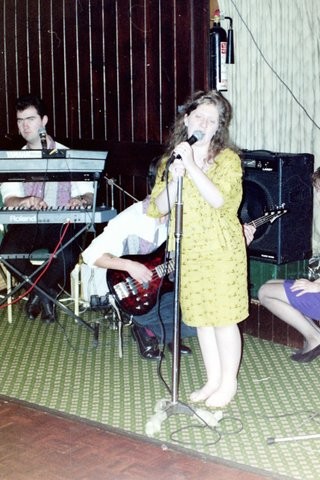 And then in third year I decided to do my dissertation on The Suppression of The Arts under The Third Reich. Because of my Jewish heritage it was a subject that fascinated me and I was always saddened when I thought about the musicians that we’d lost and the music that went with them. And you know, it turns out this was something that would come back later in my life and help shape who I am. Anyway, I ended up with a first class honours degree and I loved every minute of it.”
And then in third year I decided to do my dissertation on The Suppression of The Arts under The Third Reich. Because of my Jewish heritage it was a subject that fascinated me and I was always saddened when I thought about the musicians that we’d lost and the music that went with them. And you know, it turns out this was something that would come back later in my life and help shape who I am. Anyway, I ended up with a first class honours degree and I loved every minute of it.”
In her final workshop she created a one woman stand up show using the aforementioned journal. It was entitled ‘Oh Danny Boy Grow Up’ and it interspersed diary entries and a stand-up comedienne routine with the myths surrounding growing up in Belfast in the seventies. “I finally got to act, the surprise at the end was that I was Jewish.”
She came back to Belfast not long after that to be with her Dad who was dying of Lung Cancer; she had every intention of going back to Edinburgh or Leicester but she was given an equity card and a role in the Panto in Belfast “I played Titch. Unsurprisingly! They needed someone small and bouncy who could sing” It’s probably worth noting here that this powerhouse of a woman stands at a little under 5ft tall.
It was during this time that she met Patrick through a mutual friend; he was an assistant stage manager at the Lyric Theatre and after only six months of courting, prior to which time her Dad had died, they had moved in together.
“Whenever my Dad died the family house was sold and we all moved on. Patrick and I moved in together quickly because of this but you know, we’re still together so it worked for us! He was working with a director called Helena Kaut-Howson and she wanted something more than CDs for the theatre productions. He introduced me and before I knew it I was writing music for the theatre; my first play was The Plough and The Stars and then After The Fall by Arthur Miller.
It was almost accidental that I became the composer for The Lyric Theatre. I’ve always maintained I’m not a ‘proper’ composer but I do have an affinity with theatre composing. I had applied for an advanced acting course in Wales at the time and although I got in I never went through with it. I think then I realised that although I loved performing my heart wasn’t in acting. And I had to be realistic – because of my size the parts for me were always going to be limited. I decided to stick with the music.”
In 1989 Patrick gave up his job and the pair opened Green Dolphin Recording Studios where they offered band recording, voiceovers and production management and made the leap from theatre to conference work. Patrick did the technical side and Debra worked her charms with people in the theatre and used her strong admin skills to get the whole thing moving forward.
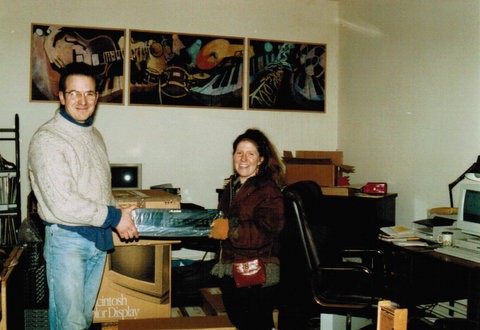
“People knew us and they liked us so they wanted to use us. We had a grant through the Enterprise Allowance Scheme of £40 a week to help set up the new business. I think that was our wages! We ran it from 1989 to 2001 and moved four times as we outgrew each studio. By the time we’d got to the Cathedral Quarter we were all-singing and all-dancing with a live room, an analogue room and all sorts.”
Over this period, as well as the business growing, Debra and Patrick were married and in 1992 she made a decision to do her Post Graduate Certificate in Music Education.
“We knew we wanted to have kids and I needed a job that would work with that. At the time I’d been offered a commission by BBC 2 to write for a film. It was one of those projects that only comes along once and I had to turn it down. I was young and daft – I should’ve handled it differently but that’s life for you. Anyway, we have two children, born two years apart in 1995 and 1997 so it was as well I did my PGCE!”
Like so many people who have built a business out of love and passion, Debra tells a tale of two people who loved what they were doing but who were lacking in the business-edge you need to keep things going. They had started the business in their flat, with people coming in and hanging out for a good time as well as a recording. When the kids came along everything changed because suddenly they had to make money!
“This was our daily business conversations. ‘Hi Patrick, I need this almost impossible thing done. I have no money. And can you do another few bits on top?’ – ‘That sounds great. Why not? Come round.’ We just couldn’t say no because we wanted to help everyone make their music!
So I was teaching a bit and writing shows; I wrote about fifty shows in ten years. Patrick was working in theatre again and we were running this business. We were done – it was too hard. It was too much for us. So when the job came up in Perth Theatre Patrick decided he wanted to move home to Scotland and we headed here at the end of 2002.”
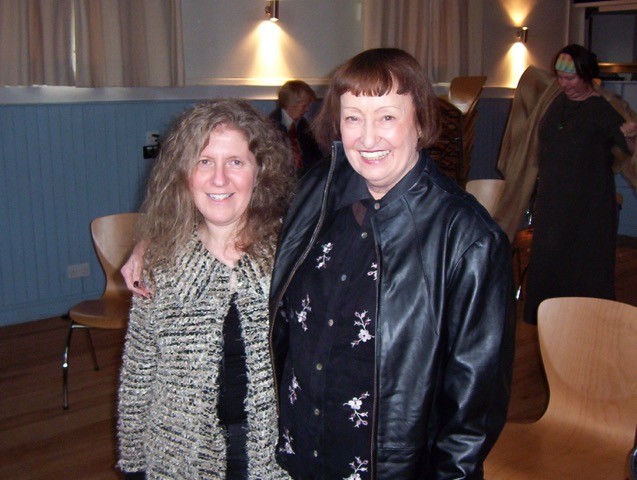 What strikes me all the way through this conversation is the fact that she a. Sings a lot, like in the middle of a sentence and b. is completely unfazed by stuff that would have knocked a lot of people off of their proverbial perch. She talks about wrapping her business up and moving to Scotland as nonchalantly as she had about her dad saying no to streaks. I see this in people who faced big life changing losses at a young age; you’re a bit damaged, but on the upside not much will drag you down because you know you can survive. She has this strong sense of perspective, happy and ready to take the next step along her life’s path. Happy and grateful that she’s playing music and has a content family.
What strikes me all the way through this conversation is the fact that she a. Sings a lot, like in the middle of a sentence and b. is completely unfazed by stuff that would have knocked a lot of people off of their proverbial perch. She talks about wrapping her business up and moving to Scotland as nonchalantly as she had about her dad saying no to streaks. I see this in people who faced big life changing losses at a young age; you’re a bit damaged, but on the upside not much will drag you down because you know you can survive. She has this strong sense of perspective, happy and ready to take the next step along her life’s path. Happy and grateful that she’s playing music and has a content family.
“We look at the kids sometimes and think ‘Thank-God’. We did it. We don’t know how but they’re 18 and 20 and still in one piece so that’s all that matters. And they’ve been kept reasonably clean and well-fed so that’s a bonus. And most importantly, they can play a few instruments!”
She’s laughing at their laid back approach; self-deprecating and clearly in awe of her kids. I suspect underneath all of this she has been one of life’s amazing mothers.
“I didn’t come to Scotland full time at first. A few years before I’d written this play about the Jewish people coming to Northern Ireland in the 1900s. It was just for a violin and it was very moving. So when Holocaust Memorial Day was announced as coming to Belfast in 2002 I was asked if they could use it. Of course, I said yes and by the end of the first year I was in a voluntary capacity as the Artistic Advisor.
Then DCAL (Department of Culture and Leisure) pulled out and Armagh City Council took over. I was asked if I would Chair it and was given the Project Co-ordinator job. It was amazing, the theme that year was Children of The Holocaust and it was held in The Market Place, Armagh to huge success.
The following year the National Ceremony for the Holocaust was coming to Northern Ireland and I was asked back to be Chair of Planning Committee. That’s why again, I ended up working between Northern Ireland and Scotland. It was too important to me to turn down and Patrick supported my decision and my mother-in-law was drafted in to help. I pulled out all my notes from that third year dissertation and suddenly I was working with the NI government, Belfast City Council and the Home Office about what was suitable and what would go into the main event or the educational projects around it. I had Seamus Heaney reading poetry; I had Raphael Wallfisch whose mother was Anita Anita Lasker-Wallfisch, the cellist who had played in the Girls Orchestra of Auschwitz and who was one of the few to survive. It summed up my feelings – he was only there because she had made it. It was an incredible experience.”
She has been back for projects twice since then; once in 2005 and once in 2007 when she co-ordinated the Remembrance Ceremony for Belfast’s contribution to the First and Second World Wars.
On settling in Perth she fell back into teaching and has worked in many of the primary schools in our Small City. Eager as always to perform though, she started Craigie Community Choir back in 2004 and this remains going to this day.
“We now share a space with Perthshire Brass. We’ve sung with Runrig at Scone and we were down to the last 60 in Last Choir Standing – I suspect we didn’t have enough sob stories or enough ‘my life won’t be complete unless we win this’ in us to go the distance! It intensified my cynicism of reality shows!
I love a choir; I think a choir is a great way to allow people to sing for the joy of it. You don’t need to perform in front of others. You can just go along and join in. One of the reasons I had the idea for the ‘Only Boys Allowed’ project was because I knew as a music specialist and as the mother of a boy that this was a problem area – if you go along to secondary schools, choirs are made up largely of girls. Boys think it’s not cool and they get nervous singing with girls. I’d worked a bit with Horsecross when they opened the Concert Hall and Patrick still works there with them, so I approached their Creative Learning department about it and we took it from there!”
To say Debra’s association with Horsecross grew, may be the largest understatement of the article! Together with other professional musicians, she has worked tirelessly with Horsecross to help them find success in their Creative Learning Programme and Horsecross Voices.
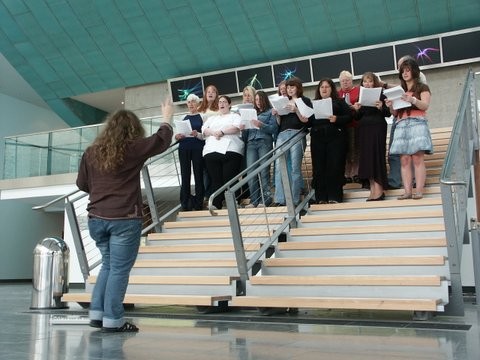
“There are an amazing group of professionals who work together to bring these projects to life. I don’t think we shout about them loudly enough. Horsecross Voices is there for anyone to enjoy, and we’ve done every style of music from Indian to Opera, Country to Jazz. Every week we have a different tutor to teach their style and the people involved really love it. Anyone can join – anyone who wants to sing can come along. We do perform sometimes, like with Southern Fried Voices. And we did A Night of Grease, mainly because I’d never been in it and I’d always wanted to be a Pink Lady!
And of course, I’ve been doing the co-ordination for The Gordon Duncan Experience for three years now. I love the talent, love it. You see these young musicians coming up and you can witness the development, watch them grow and become better at what they do. Educating youngsters and giving them a platform from which to play and bounce off one another is amazing.”
I know from my visit to The Gordon Duncan Experience on Sunday night that Debra is leaving and I wonder what she’s going to do next?
“Oh I still teach, and I’ve been doing other projects as well. I love teaching and love my choirs but I had been missing the performance side of music. So in 2008 I entered the Danny Kyle Open Stage at Celtic Connections with some of my own songs and I won! I couldn’t believe it, I thought I was too jazzy, too different. The prize was a gig at the 2009 Celtic Connections and it was so, so amazing. I thought ‘I should’ve done this twenty years ago.’ But then would I have appreciated it? I always tell the kids I teach that being famous is a by-product of doing a great job. First you have to love the music and do it well, then people will appreciate you.
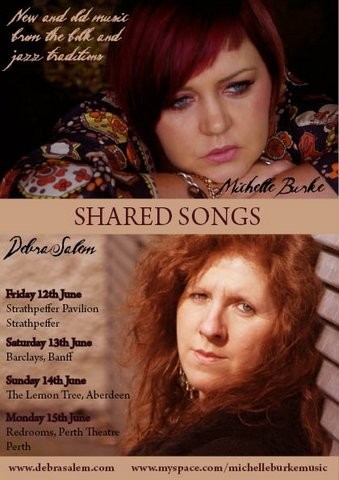 It did fire me up though and in 2009 I released my first album called ‘About Time’. I did a wee small tour with Michelle Burke who I’d met on a jazz course and it was brilliant. But I can’t sell myself, I’m rubbish at it!”
It did fire me up though and in 2009 I released my first album called ‘About Time’. I did a wee small tour with Michelle Burke who I’d met on a jazz course and it was brilliant. But I can’t sell myself, I’m rubbish at it!”
Debra talks about the differences in all the roles she has played and the hats she has worn – and continues to wear. She loves working with people, hearing stories and the voices that make up a community. She loves that her job lets her into folks' lives and allows her to connect with everyone from Primary one kids to old ladies in a choir. She also conducts the Scottish Police and Community Choir which rehearses in Perth and they are currently preparing to sing with Russell Watson in Perth and Edinburgh.
She revels in the joy of teaching six year olds American Pie and the sheer bliss at watching as her choirs stand in front of an audience and sing to great applause. Her current community work with Tayside Health Artscare Trust has seen her use vocal music therapy to help sufferers of COPD, Dementia, Palliative Care and most recently Parkinsons.
‘I watched an old lady in her eighties play the ukulele for the first time. Imagine being part of that? To help a person do something for the first time in their life – to share that with them. It’s an amazing path I’ve found myself on.
The only thing I ever regretted was my own lack of creative outlet. Whenever my album and the tour finished I was determined to have a bit of time to do that and so in 2011 I applied to the Katherine McGillivray Get A Life Fund. I applied to be funded to allow me to take a 6 month sabbatical and write theatre music, develop my own vocal teaching skills and write some new workshops. And I really wanted to set the poems of William Soutar to music. I’d been invited by The Friends of William Soutar in Perth to do two the year before and I fell in love with his work. Anyway, I went to London for the interview on the day of the Royal Wedding and they said yes – in fact they gave me enough to have a year off.
I put together In A Sma’ Room and worked with Sandy Thomson from Poor Boy Theatre who directed it. The Friends of William Soutar commissioned it and we played The Concert Hall before we toured it over Scotland and then after a two year gap took it to the Edinburgh Fringe in 2014 as part of the Made In Scotland Showcase. I get so nervous, I always think ‘This’ll be the last time I’ll do this’ and of course it never is.”
Back in the saddle of writing she has worked with Horsecross on projects including Macbeth and Seafarer, working on all Perth Theatre plays from 2012-2014. Before her success at Celtic Connections she had sung backing vocals with Dougie Mclean. The list I have is never ending and between singing me wee bursts of songs she tries to explain why she has the compulsion to do more and more.
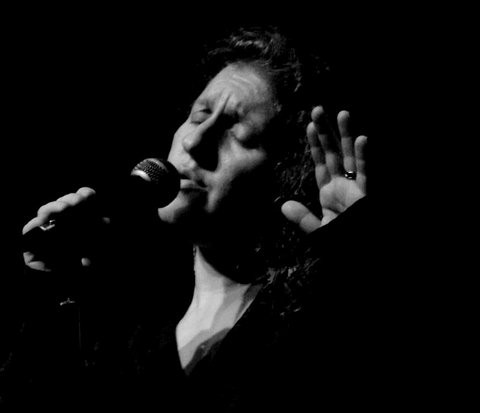 “I just think I’ve been so lucky in my life. I love sharing what I have and I love that I’ve been given an opportunity to make a difference to people. We all have a lovely time, they get stuff out of it and I get to do things I never thought I would. The kids are off to uni now, they’re both musical I’m glad to say. I think I might have a turn at doing another album, but then again, I have a few other ideas. You never know what might come up!”
“I just think I’ve been so lucky in my life. I love sharing what I have and I love that I’ve been given an opportunity to make a difference to people. We all have a lovely time, they get stuff out of it and I get to do things I never thought I would. The kids are off to uni now, they’re both musical I’m glad to say. I think I might have a turn at doing another album, but then again, I have a few other ideas. You never know what might come up!”
Small in stature, big in heart and loud in voice, Debra Salem’s understated, whirlwind musical path will, I’m sure, sweep by and entertain us all whatever that next idea that topples out of her songbook might be.
*****
DEBRA SALEM | Website| Listen and Buy Album
HORSECROSS VOICES | Find Out How To Join In
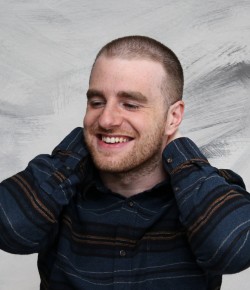
Ben Wilde has an impressive resume. At the age of 25 he is director of his own audio business with a solid reputation in the music industry, and a cli
Scott Burton's path from troubled teenager to minister of St Matthews on Tay Street is as surprising as his pink mohawk! Here's how it all happened!
August 10th Friday
Graeme Pallister, Chef Patron of 63 Tay Street in Perth talks about his life's great passions and the road that has brought him to rest at happy.
August 3rd Friday
Read all about Peggy Brunache, the woman behind the soul food at Southern Fried Festival in Perth.
July 20th Friday
SCBP
Perthshire's only online magazine